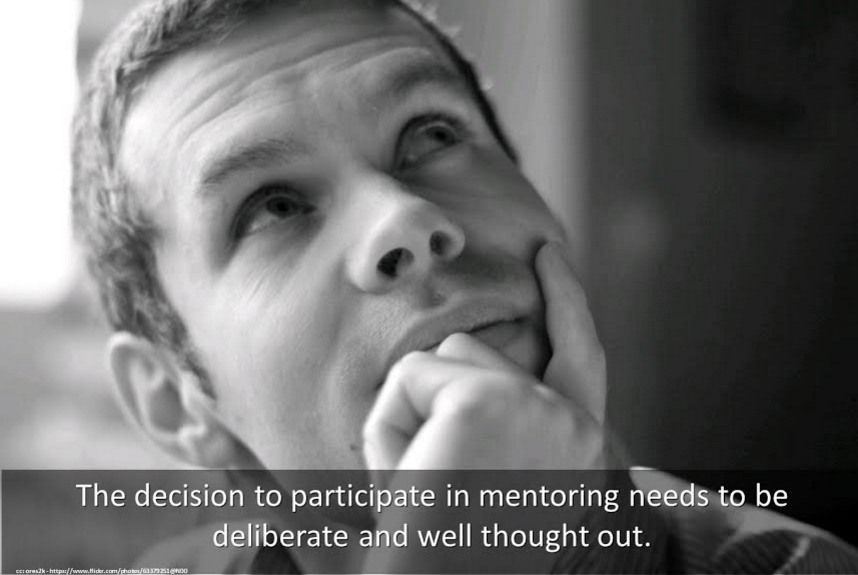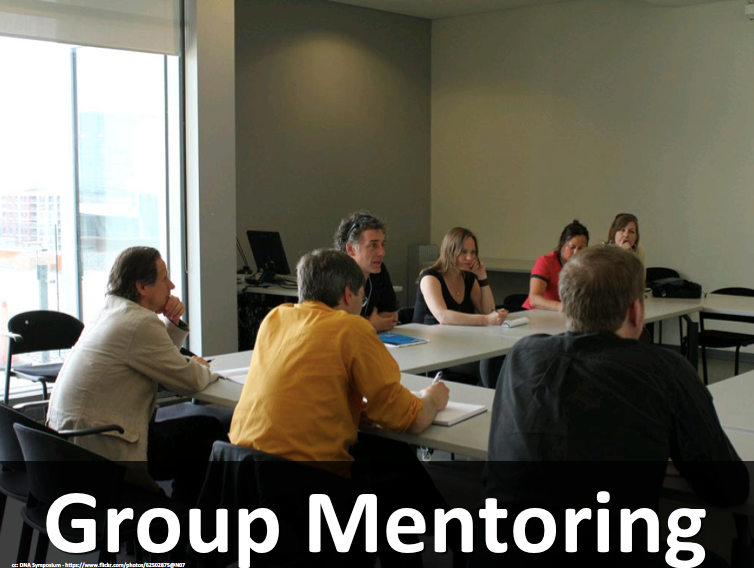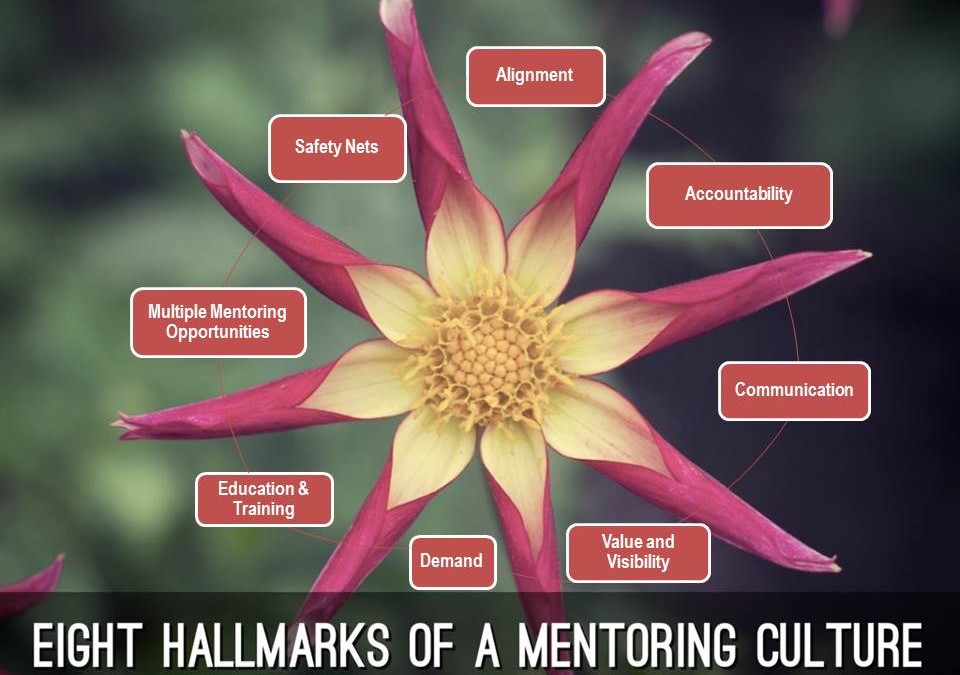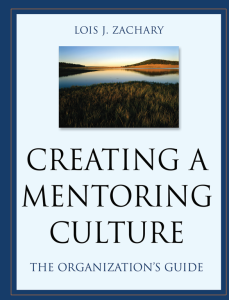
by Center for Mentoring Excellence | Aug 2, 2016 | Facilitating Learning, Making Mentoring Work For You, Mentoring Relationships
So, you’ve decided that you want to start a mentoring relationship. But now what? You need to find a mentor. That might be easier said that done, however. Finding a mentor that’s a good fit for you is an important part of the mentoring process, one that is worth the effort and the time.
And it’s about more than just finding someone you like. You need to be intentional about finding a mentor, and you must consider more than personality — consider learning styles and communication styles.
Here are some things to consider as you begin your search:
- It starts with you — What are you looking to learn? What attributes are you looking for in a mentor? Knowledge, expertise, experience (or all of the above)?
- Identify your “must haves” — What do you need to have in a mentoring relationship? Make a list!
- Use your network like crazy — Tell people what you’re looking for. You never know who they might be able to introduce you to! Meet people, get contact information, research names, find out what you can. Your network is a great tool when looking for the ideal mentor.
- Go back to your list — Once you’ve collected a list of possible mentors, figure out who meets your criteria (and who doesn’t) and begin to select the ones you’d like to reach out to.
Some do’s and don’ts:
- Don’t:
- Pick someone who will be too easy on you
- Select someone just because they like you
- Choose someone because they are the most convenient
- Opt for someone because you already have a relationship
- Choose someone you report to directly
- Do:
- Seek a good learning fit between what you need and what this person has to share
- Find out if this person has sufficient time to mentor you
- Ask yourself if this person will challenge and encourage you to constantly raise the bar for yourself
- Consider if this person appears to be a good listener, has a sincere desire and willingness to mentor, and the knowledge and expertise you need.
Now the fun part: Meet them! Make sure to set up time to get to know your potential mentors, and see if they fit your mentoring criteria. Once you meet them you’ll quickly be able to tell if they are the right one for you.
(Photo via Flickr CC: Mateus Lunardi Dutra)

by Center for Mentoring Excellence | Jun 20, 2016 | Facilitating Learning, Making Mentoring Work For You
Your company has just announced a new mentoring initiative that has generated a groundswell of interest and excitement. Your supervisor has signed you up as a mentor and just let you know. Gulp! What am I in for?
You are busier than ever on top priority and high impact projects and you know there are three more waiting for you once those are completed. Additional responsibilities in your role are stressing you out.
Now you have been “voluntold” that you must participate in the initiative as a mentor.  Can you say no? How would it look if you didn’t participate? What would your supervisor think? What would it say about your ability to manage your workload?
Can you say no? How would it look if you didn’t participate? What would your supervisor think? What would it say about your ability to manage your workload?
Mentoring participation is a serious commitment. Participating because you’ve been voluntold isn’t a good enough reason to say yes. You have to want to be a mentor. It takes time and effort, and without a serious personal commitment you may well not have the energy and enthusiasm you will need to be successful.
Know that you are not alone. Peer pressure can be bad enough without being voluntold by one’s supervisor.
Here are six questions to consider before making this hard decision:
1. Do I have a sincere desire to engage in a mentoring relationship?
2. Am I willing to do the work required to prepare for mentoring meetings?
3. Do I possess the requisite knowledge, expertise or experience to mentor a mentee?
4. Do I have sufficient time right now to mentor a mentee?
5. Do I feel comfortable being a mentor?
6. What competencies or skills do I possess that would make me a good mentor?
If you can’t do the job that being a good mentor requires, It is best to speak up and say no (even if you have been voluntold).

by Center for Mentoring Excellence | May 27, 2016 | Facilitating Learning, Group Mentoring
When we think of mentoring relationships, we usually think of one-on-one interactions with a mentor and a mentee. But that doesn’t always have to be the case. In fact, for many organizations, group mentoring has become an equally effective (and often more efficient) way to offer mentoring services to employees. But what is group mentoring and how does it work? Here are three ways to approach group mentoring.
Team mentoring
This one is pretty self-explanatory. A group of mentors, each with their own unique set of skills and mentoring expertise, work with mentees to give them a well-rounded and multi-faceted mentoring environment.
Note: Make sure team mentors are given the necessary tools and training to make their relationships successful.
Peer mentoring
Again, the name says it all. There’s a lot that can be learned from our fellow mentees; allowing mentees to, in turn, mentor their peers is a powerful way to reinforce mentoring practices and instill leadership qualities beyond traditional mentoring settings.
Note: Goal-setting and self-direction are key. It also helps if peer mentors have similar roles, experiences and interests.
Facilitated group mentoring
What if your mentoring journey was influenced by those seeking mentoring services just like you? Chances are, you’d be exposed to new and exciting ways of thinking. That’s the idea behind facilitated group mentoring. While you still work with a traditional mentor figure, your fellow mentees will help set agendas, group goals and influence your experience in ways you wouldn’t have otherwise been able to predict.
Note: Make sure every member of the group has a specific role and responsibility; this ensures people don’t feel left out or unheard. It also helps to limit mentoring groups to eight people or less.
So, what do you think? Is group mentoring for you? Have you tried it in the past? Let us know.

by Center for Mentoring Excellence | May 18, 2016 | Mentoring Training
Mentoring at “Ideal Organization” (IO) grew out of a formal program for high potentials. The initial program created such a buzz throughout IO that now, ten years later, its participants are still committed to mentoring others and initiating mentoring opportunities in their own organizations. Several years ago an organizational survey revealed that in addition to one-on-one informal mentoring and formal mentoring programs, multiple groups actively engaged in mentoring (i.e., women’s executive mentoring, technical mentoring, and cross-functional mentoring). Leaders regard mentoring as part of their responsibility to informally mentor employees who show promise. Those charged with managing, supporting and coordinating mentoring efforts at IO monitor progress, measure results and work with teams throughout the organization to integrate mentoring process improvements. In addition, they keep an internal focus on mentoring. They coordinate mentoring efforts to make sure that all mentoring programs align with one another other and with the organization’s culture.
Mentoring at IO is always in motion and constantly creating learning bridges that empower individuals to transform Ideal so that it continues to live up to its name. The leaders at IO worked through a number of steps and phases in developing its mentoring culture. It’s still a work in progress.
Sounds great, yes?
Is your organization committed to making an ongoing investment in mentoring? If you’re serious about mentoring and are committed for the long haul, read on.
A mentoring culture creates a continuum of expectation about mentoring and establishes a standard of excellence for mentoring practice. It also encourages mentoring excellence by continuously creating readiness for mentoring within the organization, facilitating multiple mentoring opportunities, and building in support mechanisms and safety nets to ensure individual and organizational mentoring success.
 What’s more, it:
What’s more, it:
- Establishes ownership for mentoring within the organization
- Promotes shared responsibility
- Maximizes resources
- Maintains integrity
- Facilitates knowledge utilization
- Supports integration of key processes into the organization
- Creates openness to learning through mentoring
- Shortens ramp up time
What are you waiting for? To learn more, purchase your copy of Creating a Mentoring Culture today. It will guide you through each of the eight hallmarks that contribute to creating a vibrant and full mentoring culture.

by Center for Mentoring Excellence | Apr 14, 2016 | Growth and Development, Making Mentoring Work For You, Mentoring Communication, Mentoring Questions, Mentoring Relationships
Chemistry. Compatibility. While these traits are crucial to a successful mentoring relationship, there’s so much more involved, most importantly — you. What do you want to learn? Who do you want to learn it from? Recruiting a mentor can seem like a daunting task, but being thorough and prepared when making the ask leads to success.
How to Prepare
Have a conversation with yourself:
- Identify what it is you need to learn.
- Think about what you need from a mentor.
- Consider how much time you can contribute to a mentoring relationship. Look yourself in the mirror and honestly consider if you have the time, willingness and commitment to mentoring.
- Think about your prior mentoring experiences and how you can actively contribute to the success of your relationship.
Ask yourself some important questions:
- Am I sincerely interested in learning?
- Am I willing to commit time to developing and maintaining a mentoring relationship?
- Am I willing to be open and honest with myself and another person?
- Can I participate without aversely affecting my other responsibilities?
Making the Ask
You can do all the preparation in the world, but if you aren’t able to communicate your needs and ask a potential mentor for their time and energy in an inviting and honest way, you may lose out on a great mentoring opportunity.
Make sure to clearly communicate:
- What you want to learn.
- Why you want to learn it.
- Why you think this person is a good match for you.
- What you need from the relationship.
- What you are willing to contribute.
Make sure to present yourself as:
- Competent
- Committed
- Compatible
- Conscientious
- Ready to Learn
- Accountable
With the right preparation, the right communication and the right presentation, you’ll be able to set yourself up for success when asking a potential mentor for their help.
How have you sought out mentors? What worked and didn’t work for you?



 Can you say no? How would it look if you didn’t participate? What would your supervisor think? What would it say about your ability to manage your workload?
Can you say no? How would it look if you didn’t participate? What would your supervisor think? What would it say about your ability to manage your workload?

 What’s more, it:
What’s more, it:

